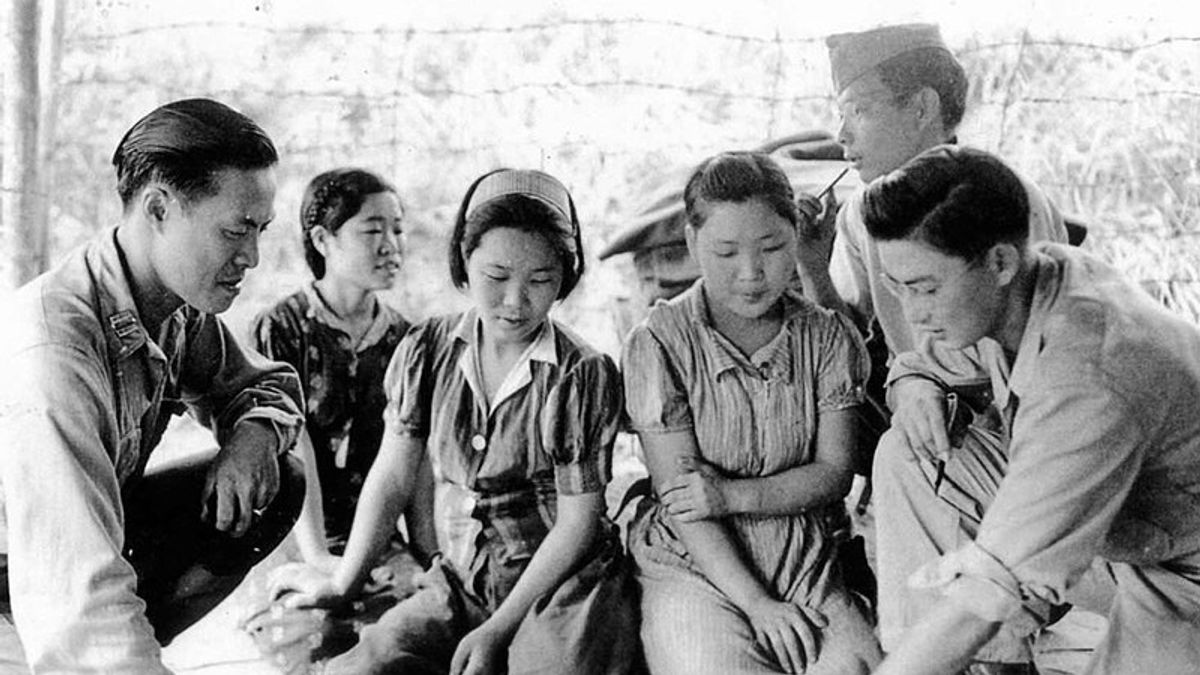JAKARTA - On January 17, 1992, Japanese Prime Minister (PM) Kiichi Miyazawa delivered a formal public apology. His apology was for Japan's forcing tens of thousands of Korean women to become sex slaves for Japanese soldiers during World War II.
Miyazawa delivered his formal apology during a visit to Seoul, South Korea (South Korea). In a speech to the South Korean National Assembly, Miyazawa said: "Recently, the matter of 'comfort women' serving in the Imperial Japanese Army has been brought to light. I offer my sincere apologies."
Miyazawa's visit to Seoul was preceded and accompanied by a vigorous campaign in the South Korean media for an apology from the Japanese prime minister. They also demanded compensation from Japan for the surviving women.
The Japanese government initially denied the existence of brothels during the war. In 1993, the then chief cabinet secretary, Yohei Kono, admitted to the crime and apologized for the first time for Japan's sex slave system.
Japanese and South Korean officials said Miyazawa also apologized in a second round of talks with South Korean President Roh Tae-woo. Miyazawa said at a joint press conference afterwards that Japan would sincerely investigate the matter.
In December 1991, three Korean women who were forced to have sex with Japanese soldiers filed a compensation suit in a Japanese court. However, during the meeting, neither Miyazawa nor Roh Tae-woo discussed the compensation issue.
Citing the New York Times, Korean historians estimate that 100,000 to 200,000 Korean women were forced into sex slavery by Japanese soldiers before 1945. These women were abducted by Japanese soldiers, then forced to serve the soldiers.
After the end of World War II, documents related to the "comfort women" system were destroyed by Japanese officials. So that the number is based on estimates by historians who rely on various extant documents. When Japan rebuilt after World War II, stories of sex slavery were belittled and dismissed as tales of the unpleasant past.

A memorial statue of victims of sex slavery in front of the Japanese Embassy in South Korea. (Photo: Wikimedia Commons)
When many Japanese officials and society forgot about it, women who had been forced into sex slavery became outcasts. Many died from sexually transmitted infections or complications from cruel treatment at the hands of Japanese soldiers. Others committed suicide.
For decades, the history of "comfort women" was not documented and paid attention to. When the issue was discussed in Japan, it was immediately refuted by officials who insisted that coercion never existed.
Then, in the 1980s, some women began to share their stories. In 1987, after the Republic of South Korea became a liberal democracy, women began discussing their plight in public. In 1990, the issue became an international dispute when South Korea criticized Japanese officials' rejection of the event.
ApologyIn 2015, Japanese Prime Minister Shinzo Abe offered his "most sincere apologies" to women in a statement released in Seoul by Foreign Minister Fumio Kishida. However, it was not clear whether the statement was an apology to any living "comfort women" or in its entirety.
The Japanese government also recognizes that its military authorities played a role in the sexual slavery of women. However, Japan is still adamant about avoiding legal liability.
“The problem of comfort women, with the involvement of the Japanese military authorities at that time, was a grave insult to the honor and dignity of a large number of women, and the Japanese government. Japan is well aware of its responsibilities from this perspective,” Foreign Minister Kishida said, citing The Guardian.
Prime Minister Abe also called South Korea's then-president, Park Geun-hye, who described the dispute over sex slaves as the "biggest obstacle" to improving Korea-Japan relations. Abe later repeated his apology.
Japan also agreed to pay 1 billion yen for the survivors. Meanwhile, South Korea agreed to refrain from criticizing Japan on the matter and to remove a memorial statue of the victims from the front of the Japanese embassy in Seoul.
It took a long time for South Korea to accept a formal apology from Japan, pay compensation to the surviving women and acknowledge its legal responsibilities. Japan stopped acknowledging legal responsibility and stressed that providing compensation funds was a humanitarian gesture.
*Read other information about TODAY's HISTORY or read other interesting articles from Putri Ainur Islam.
TODAY'S HISTORY MoreThe English, Chinese, Japanese, Arabic, and French versions are automatically generated by the AI. So there may still be inaccuracies in translating, please always see Indonesian as our main language. (system supported by DigitalSiber.id)









